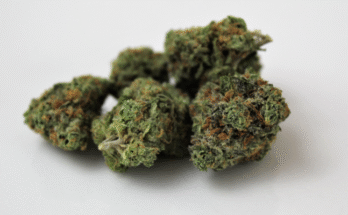Do your parents know you consume cannabis? Have you talked to them about it?
If they’re anything like mine, at first they’d be concerned and disapprove of your wacky baccy use.
However, once you tell them about the many evidence-backed benefits of cannabis, as well as explaining the true risks of cannabis use and the modern techniques to minimise them, they should be more understanding.
Perhaps even curious.
If you decide to talk to your parents about weed and need some helpful pointers on things to bring up, here are some ideas…
1. Talk about the endocannabinoid system
The endocannabinoid system (ECS) is a very important bodily system that rarely gets discussed outside of the cannabis field. Although it’s relatively new to science, the ECS plays a role in regulating physiological and cognitive processes, including fertility, pregnancy, pre- and postnatal development, immune response, appetite, pain-sensation, mood, and memory.

It’s also how cannabis exerts its effects on us – cannabinoids found in cannabis, such as THC and CBD (there are over 100 more), mimic chemicals produced naturally by the body to stimulate receptors of the ECS.
The chemicals produced within the body are known as endocannabinoids and are a part of the body’s ECS. Anandamide, for example, has been found to be the cause of ‘runner’s high’ – the mood boost you get after exercise. THC mimics anandamide in many ways, which is why it can also boost your mood when used appropriately.
2. Go over the health benefits
Cannabinoids have been found to offer a whole range of health benefits and to be useful in treating a number of conditions – and that includes THC, the cannabinoid that gets you ‘stoned’ as your parents probably say.
For example, cannabinoids have strong anti-inflammatory and neuroprotective properties that can help treat brain injuries and neurodegenerative diseases like Alzheimer’s and Parkinson’s, while it’s also effective for arthritis and some autoimmune conditions.
THC is also effective at treating some forms of epilepsy, while CBD has potential in treating mental health conditions including addiction and anxiety disorders.

Not only that, cannabis and cannabinoids are extremely safe and completely non-toxic. The only real danger is taking too much THC for your level of tolerance, resulting in a racing heart, possible palpitations and often intense paranoia or anxiety.
Serious issues are extremely rare and death is impossible from cannabinoids alone.
3. Tell them it’s been legalised for medical use in the UK
The medicinal properties of cannabis are so undeniable that even the UK government has had to acknowledge them by legalizing medical cannabis back in late 2018.
While it’s still difficult to get on the NHS, a number of private cannabis clinics have now sprung up around the country and thousands of prescriptions have been written and fulfilled.

4. Mention CBD and other non-psychotropic cannabinoids
CBD oil has been unmissable the past few years, making its way into health shops, supermarket shelves, local coffee shops and farmer’s markets. Chances are your parents would have at least heard of CBD.

However, CBD is just one of over 100 cannabinoids – with each offering their own unique properties. CBG, for example, is another cannabinoid with much therapeutic potential that is currently available in the UK.
While the science of these less common cannabinoids is very much in its infancy, many scientists and researchers are optimistic about the developments that studying these unique compounds will provide the medical field.
Try to explain to your parents that cannabis is a lot more than just getting high on THC. Most cannabinoids do not cause alterations in perception like THC and some, like CBD, even have the ability to reduce the negative effects of THC like anxiety and paranoia.
5. Discuss alternative methods of consumption to smoking (dry herb vaping, eating, sublingual)
If your parents have tried cannabis, it was probably a while ago and likely via a joint/spliff.
While joints are still popular, modern technology means there are much healthier and more convenient ways to consume cannabis – like using a dry herb vape, oils and healthy edibles.

Your parents may also appreciate cannabis-infused balms, creams and other cosmetics, which can be particularly beneficial for the skin and hair. My own mum loves CBD bath bombs and CBD coffee.
6. Acknowledge the risks and explain the relationship between cannabis and psychosis (correlated not causal)
One of the main objections your parents may bring up is the link between cannabis use and psychosis.
Now, while there is indeed a link present, that link has yet to be proven to be causal. In my opinion, smoking high-THC weed during adolescence probably can increase risks of psychosis. However, healthy adults have little increased risk.
This is displayed by the fact that while cannabis use has increased in many populations, including the UK, the corresponding level of psychosis incidence has not.
Therefore, when used mindfully, intentionally and, ideally, via one of the healthy consumptions methods mentioned above by an adult, cannabis is very safe. A lot safer than alcohol, tobacco, caffeine, aspirin and peanuts.
Additionally, rates of addiction are low and can be massively reduced further with the concurrent use of CBD, safe methods on consumption and mindful use. This book can also help.
7. Tell them the truth about skunk
The term ‘skunk’ is nothing but a tabloid buzzword. In reality, skunk is just high-THC cannabis – you know, like the high-THC cannabis being prescribed by UK doctors.
Before the word was hijacked by fear-mongering journalists, skunk (or Skunk #1) was actually the name of a certain cultivar (or strain) of cannabis – no different to hundreds of other strains that have been developed around the world.

It was given its name due to its pungent smell, which resembles that produced by a skunk, just as Lemon Haze, another strain with high levels of THC, was named due to its citrusy stench.
Giving your parents cannabis
After dropping all this knowledge on them, if your parents still believe that “drugs are bad” and smoking “skunk” will rot your brain and your life chances, then their programming is deeply entrenched and may never be removed.
However, if your parents are rational, nuanced and open-minded, they might not only be understanding of your choice to consume the herb, they’ll hopefully be keen to try some themselves.
I mean, there aren’t many people who wouldn’t benefit from the stress-reducing, anti-inflammatory, anti-anxiety, pain-killing, mood-boosting effects that cannabinoids offer.

If they do want to get their toes wet, CBD products are a good place to start. If your parents do want to try THC, make sure they take it slow and use CBD alongside to counteract any unpleasant effects – remember that high doses of THC can reliably produce anxiety and paranoia in those new to cannabis.
Also, method of consumption is important. I’d say dry herb vaping is probably the best way for newcomers to consume THC as it’s easy to microdose by taking a small puff or two.
This should go without saying, but please don’t give your folks a bong hit or homemade edibles for their first time. Ease them into the experience so that benefits can be felt and they’re not overwhelmed by psychoactive effects.
Good luck!




